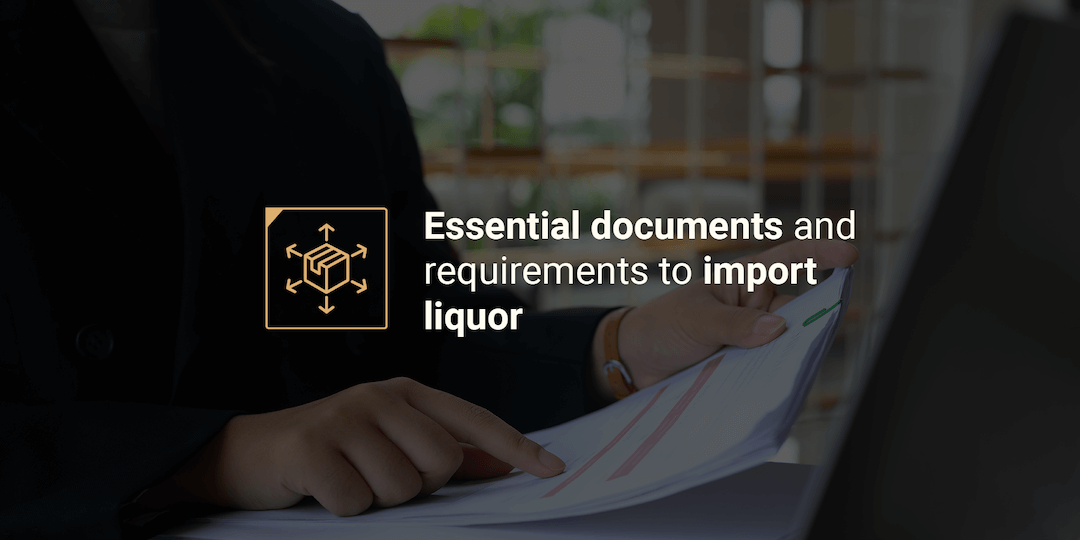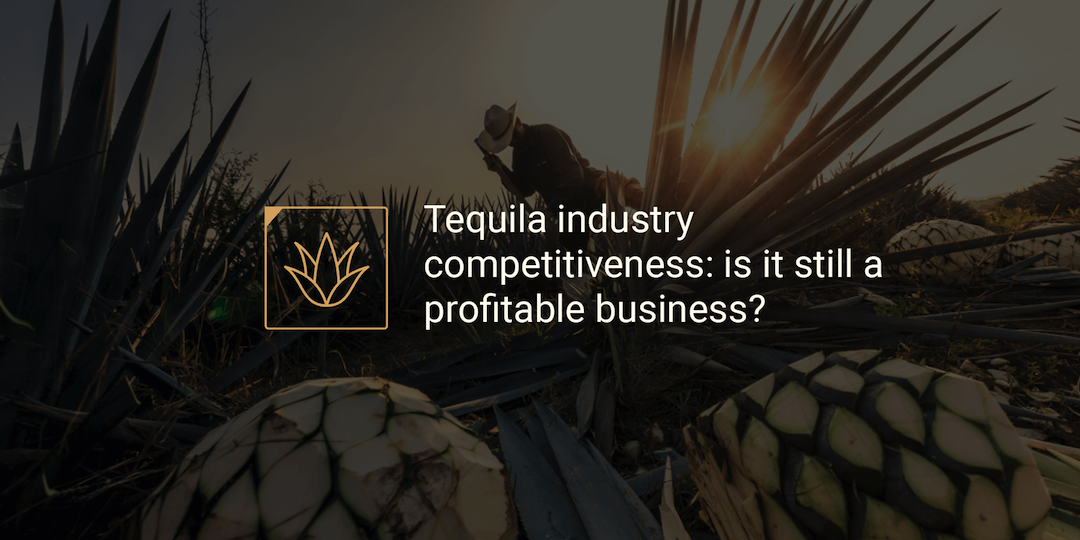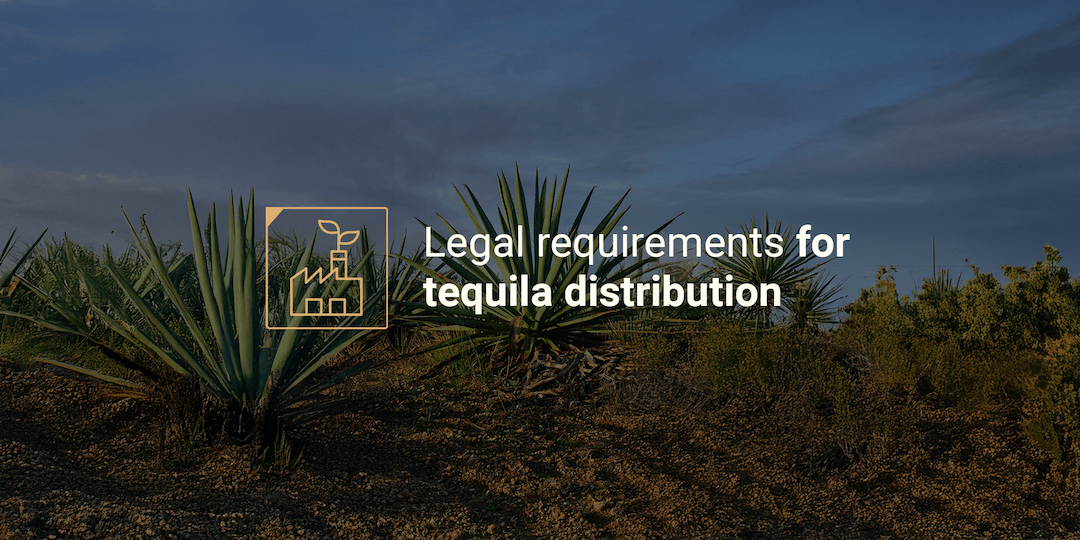How to become a liquor importer: your step-by-step guide
Becoming a liquor importer can be a rewarding venture. However, it requires you to navigate a complex landscape of regulations, permits, and procedures.
But, how to import liquor and succeed in such a competitive market? Along this article we will walk you through the step-by-step process.
That way you’ll understand the intricacies of importing alcohol and meet your goal.
How to import liquor? Understanding the bases
Liquor importing is a complex yet rewarding endeavor that requires a solid understanding of various fundamental concepts.
To help you lay a strong foundation for your business, in this section we will provide a comprehensive overview of the essential aspects of liquor importing.
What is liquor importing?
Liquor importing involves bringing alcoholic beverages from one country into another.
A host of legal requirements regulates this process, both in the exporting and importing countries.
The United States, for instance, has stringent regulations that must adhere to, ensuring the safe and lawful importation of alcohol.
Key steps in the liquor importing process
- Research and market analysis: Before importing alcohol, it's crucial to conduct thorough research and market analysis.
- Understanding regulations: Each country has its own set of regulations regarding alcohol imports.
- Obtaining necessary permits: Importing alcohol requires various permits and licenses. For example, the Federal Basic Import Permit is a primary requirement for anyone looking to import alcoholic beverages into the U.S.
- Compliance with Customs and Border Protection (CBP): Importers must ensure that all shipments comply with CBP regulations, including proper documentation and payment of duties and taxes.
What types of alcoholic beverages can you import?
When considering liquor importing, it's essential to understand the different categories of alcoholic beverages and their specific requirements:
- Wine: Importing wine requires adherence to specific labeling and packaging regulations.
- Beer: Beer importation also involves compliance with labeling requirements. Importers must be aware of any state-specific regulations that may apply to the distribution and sale of beer.
- Spirits: Importing spirits, such as tequila, vodka, and whiskey, requires compliance with federal and state regulations.
Given the complexity of liquor importing, partnering with experts can significantly ease the process.
Companies like Dialce, with extensive experience in tequila exportation, can provide invaluable support.
They offer expertise in navigating regulatory requirements, obtaining necessary permits, and ensuring compliance with federal and state laws.

Essential steps to become a liquor importer
1. Understand legal requirements and permits
Navigating the legal requirements and obtaining the necessary permits and licenses is crucial for becoming a successful liquor importer.
This section details the essential permits and licenses you need, the process for obtaining them, and the regulations you must comply with to legally import alcohol.
Federal Basic Import Permit
The primary requirement for importing alcohol is securing a Federal Basic Import Permit.
This permit is mandatory for all individuals and businesses wishing to import alcoholic beverages.
Here are the steps to obtain this permit:
- Application Process: Start by completing the TTB F 5100.24 application form, available on the TTB's website. This form requires detailed information about your business, including the names of the owners, business address, and type of alcoholic beverages you intend to import.
- Supporting Documents: Along with the application form, you must submit various supporting documents, such as proof of business registration, a copy of your business license, and any relevant financial statements.
- Background Check: The TTB will conduct a thorough background check on all the principal individuals involved in your business. This includes checking for any previous violations of alcohol-related laws or other criminal activities.
- Review and Approval: The TTB will review your application and supporting documents. If everything is in order, you’ll receive a Federal Basic Import Permit.
Import Permit
In addition to the Federal Basic Import Permit, specific import permits may be required based on the type of alcoholic beverages you intend to import and the states in which you plan to distribute them.
Some states and countries have their own import regulations and may require additional permits.
For instance, importing tequila may require different permits than importing wine or beer.
- State Permits: Each state has its own set of regulations and permit requirements for importing alcohol. It’s essential to research and comply with these state-specific requirements to avoid legal issues.
- Permits Online: Many states offer the convenience of applying for permits online. Check the official websites of the states’ alcohol regulatory agencies for detailed information on their permit application processes and requirements.
Federal Alcohol Administration Act
The Federal Alcohol Administration Act (FAAA) sets forth the regulations governing the importation, distribution, and labeling of alcoholic beverages, specifically in the U.S.
Compliance with this act is mandatory for all importers.
- Label Approval (COLA): One of the key requirements under the FAAA -for the United States- is obtaining a Certificate of Label Approval (COLA) for each product you import.
- Advertising and marketing: Importers must ensure that their promotional materials do not make false or misleading claims about their products and that all advertisements comply with federal guidelines.
Certificates of Label Approval (COLA)
One of the most critical components of importing alcoholic beverages into the United States is obtaining Certificates of Label Approval (COLA).
COLA plays a vital role in the alcohol importation process.
You can complete the application process online, through the TTB's COLAs Online system.
This user-friendly platform allows importers to submit applications, track their status, and communicate with TTB officials.
If you want to know more about the requirements to export alcohol from the USA, read our complete guide: Requirements to export alcohol from the USA: the essentials.

Remember that being a licensed importer is not just about obtaining the necessary permits; it also involves adhering to ongoing compliance requirements.
You are responsible for maintaining accurate records of all imports, ensuring that all products meet federal and state labeling requirements, and paying all applicable taxes and duties.
2. Get up to date with federal regulations and taxes
Navigating the federal regulations and taxes associated with importing alcoholic beverages is a critical aspect of becoming a successful liquor importer.
Each country has its own set of rules and tax structures, and understanding these is essential for compliance and smooth operations.
Federal regulations governing alcohol imports
Several key federal regulations and acts govern the process of importing alcoholic beverages in different countries:
- European Union (EU): The EU has comprehensive regulations for alcohol importation, ensuring compliance across member states. Importers must adhere to the regulations outlined in the EU Alcohol Strategy, which covers labeling, health warnings, and advertising standards. Additionally, importers need to obtain an EORI (Economic Operators Registration and Identification) number for customs processing.
- Canada: Canada Border Services Agency (CBSA) and the Canada Revenue Agency (CRA) regulate the importation of alcoholic beverages. Importers must obtain an Importer's License from the CRA and comply with the labeling and advertising regulations set forth by the Canadian Food Inspection Agency (CFIA).
- Australia: The Australian Border Force (ABF) oversees the importation of alcoholic beverages into Australia. Importers must obtain an excise license from the Australian Taxation Office (ATO) and ensure that all products comply with the Australian New Zealand Food Standards Code, which includes labeling and health warnings.
- Japan: The National Tax Agency (NTA) regulates the importation of alcoholic beverages. Importers must obtain an Alcohol Import Permit and comply with stringent labeling requirements, including Japanese translations of product information.
- India: The Central Board of Indirect Taxes and Customs (CBIC) regulates importation of alcoholic beverages into India. Importers must obtain an Importer Exporter Code (IEC) from the Directorate General of Foreign Trade (DGFT) and comply with the labeling standards set by the Food Safety and Standards Authority of India (FSSAI).
Federal Excise Taxes
In addition to comply with federal regulations, importers must be prepared to handle various taxes, such as the Alcohol and Tobacco Tax and Trade Bureau (TTB) in the United States.
The most significant worldwide tax is the so-called federal excise tax.
Types of Federal Excise Taxes
The federal excise tax rate varies depending on the type and quantity of alcoholic beverage you are going to import.
The three main categories are:
- Distilled Spirits: The tax on distilled spirits (such as tequila, vodka, and whiskey) depends on proof gallons or liters. The rate is generally higher for distilled spirits compared to wine and beer due to their higher alcohol content.
- Wine: Alcohol content and type determine the tax on wine. For example, tax is lower on still wines with an alcohol content of 14% compared to sparkling wines or wines with higher alcohol content.
- Beer: Taxes on beer depend on the volume of barrels or liters imported. Rates can vary depending on the country and whether the importer qualifies for any tax reductions or exemptions.
In case of not having an ally that helps with exportation and importation issues, importers are responsible of applying for a federal permit, calculating duty rates and paying federal excise taxes to the relevant tax authority in each country.
This process involves filing the appropriate tax returns and making payments electronically where possible. It is essential to maintain accurate records of all transactions and payments to ensure compliance and avoid penalties.
Failure to comply with federal excise tax requirements can result in severe penalties, including fines, interest on unpaid taxes, and potential revocation of import permits.
To avoid further consequences, partnering with experts like Dialce is the solution. We can provide invaluable guidance and support, helping you navigate the complexities of federal regulations and taxes.

3. Master the customs and border protection regulations
Customs and Border Protection (CBP) authorities worldwide play a vital role in the importation of alcoholic beverages into their respective countries.
These agencies are responsible for ensuring that all imports comply with national laws and regulations, facilitating lawful trade, and protecting their nation's borders.
This section will delve into the specific responsibilities of customs authorities in the context of alcohol importing and provide a detailed overview of how importers can navigate these requirements globally.
The role of custom authorities
- Regulating imports: Customs authorities enforce import regulations to ensure that all alcoholic beverages entering their country comply with national laws. This includes verifying that imports have the necessary permits, certifications, and labeling approvals.
- Ensuring compliance: Agencies work closely with other governmental bodies to ensure that importers adhere to all applicable regulations.
- Protecting public health and safety: By regulating the importation of alcoholic beverages, customs authorities help protect public health and safety. This includes preventing the entry of counterfeit or substandard products that could pose health risks to consumers.
- Facilitating trade: While enforcing regulations, customs agencies also aim to facilitate lawful trade by streamlining import processes and reducing unnecessary barriers.
Key responsibilities of custom authorities in alcohol importing
- Documentation and entry procedures: Importers must submit accurate and complete documentation for all shipments of alcoholic beverages. Customs authorities review these documents to verify requirements are on rule.
- Label approval verification: Customs checks that all imported alcoholic beverages have obtained the necessary label approvals from relevant authorities.
- Duty and tax collection: Agencies are responsible for collecting import duties and excise taxes on alcoholic beverages. Importers must pay these fees as part of the entry process.
- Inspections and examinations: Customs conducts physical inspections and examinations of shipments to ensure compliance with regulations.
- Trade enforcement and compliance: Customs enforces trade laws and agreements to prevent unfair practices such as dumping and the importation of counterfeit goods.
Customs requirements for alcohol importing
- Pre-import preparation: Before importing alcoholic beverages, ensure that all necessary permits and approvals are in place.
- Accurate documentation: Maintain accurate and complete documentation for all shipments. Provide detailed information about the products, their origin, and their intended use.
- Comply labeling requirements: All labels must comply with national standards and go through the necessary processes for approval.
- Payment of duties and taxes: Be prepared to pay the required import duties and excise taxes.
- Stay informed and updated: Keep up-to-date with changes in regulations and requirements. Customs and other relevant authorities periodically update their guidelines, staying informed helps ensure ongoing compliance.
4. Be aware of the unique regulations of the beverage you’re importing
Importing alcoholic beverages involves understanding the specific regulations and requirements for each type of alcohol.
Different types of alcohol have unique import regulations that vary by country.
Importing tequila
Tequila production usually takes place in Tequila, Mexico. This distilled spirit comes from the blue agave plant.
Importing tequila requires compliance with various regulations to ensure product authenticity and quality, such as:
- Origin and certification: There are designated regions in Mexico for the production of tequila. To legally label the beverage as “tequila”, you have to produce it in these regions and obtain a certificate of authenticity from the Mexican government, verifying that the product meets the standards set by the Tequila Regulatory Council (CRT).
- Labeling requirements: Importers must ensure that tequila labels comply with international standards, including accurate information about the product's origin, alcohol content, and any health warnings.
- Customs and excise taxes: Importing tequila involves paying customs duties and excise taxes, which vary by country. In the United States, for example, importers must pay federal excise taxes based on the proof gallons of tequila imported. European countries also impose excise duties on imported spirits, calculated based on alcohol content and volume.
- Trade agreements: Certain trade agreements, such as the United States-Mexico-Canada Agreement (USMCA), may offer reduced tariffs or streamlined import processes for tequila.
The Dialce advantage
When it comes to liquor importation, partnering with Dialce by The iidea Company offers a distinct advantage that sets us apart as your ideal business partner.
With our unparalleled expertise in bulk tequila exportation and a commitment to excellence, Dialce is uniquely positioned to support and enhance your journey into the tequila industry.
But what exactly makes us your ideal partner to navigate the complexities of starting a tequila business?
1. Expertise in tequila exportation
Dialce boasts extensive experience and knowledge in the exportation of tequila, a quintessential Mexican spirit renowned worldwide for its craftsmanship and quality.
Our deep-rooted understanding of tequila production, distribution networks, and regulatory landscapes enables us to provide invaluable insights and guidance to importers looking to enter the global market.
2. Comprehensive support and guidance
Partnering with Dialce means gaining access to comprehensive support throughout the entire importation process.
From navigating complex regulatory requirements to securing necessary permits and approvals, we make sure your importation journey is seamless and compliant.
We offer personalized assistance tailored to your specific needs, helping you overcome challenges and capitalize on opportunities in the competitive and outgrowing tequila industry.
3. Commitment to quality and compliance
Quality and compliance are at the core of everything we do at Dialce.
Dialce's bulk tequila is crafted in state-of-the-art distilleries in Jalisco, Mexico, combining traditional techniques with modern innovation to ensure exceptional quality.
We adhere strictly to federal regulations ensuring that all imported products meet stringent standards for safety, labeling, and consumer protection.
Our meticulous attention to detail and commitment to excellence give you peace of mind, knowing that your products are in capable hands.
Choosing Dialce as your partner for tequila importation means gaining a strategic ally dedicated to your success.
With our unparalleled expertise in bulk tequila and exportation, comprehensive support services, commitment to quality and compliance, and insightful market guidance, we empower you to navigate the complexities of alcohol importation with confidence and achieve your business goals.
Experience the Dialce advantage and unlock the potential of your imported liquor brands in the dynamic global market.
To become a liquor importer, you must partner with an expert
This detailed guide has equipped you with the essential information on how to become a liquor importer and succeed in the process.
Familiarizing yourself with federal regulations, customs procedures, and excise taxes is essential to ensure compliance and successful importation of alcoholic beverages.
Whether you are interested in importing wine, beer, or other spirits, having a reliable partner can make a significant difference.
Dialce stands out as a trusted expert in the field of tequila exportation.
Our in-depth knowledge and experience in the industry position us as the ideal ally for your liquor importation needs.
We provide exceptional support and guidance, ensuring a seamless import process.
Start your business today, get in contact with us! Our team is ready to assist you with all your importation needs, from obtaining permits to navigating federal regulations.
If you want to know more about the industry, we recommend: Bulk tequila: purchasing process, prices and recommendations.







